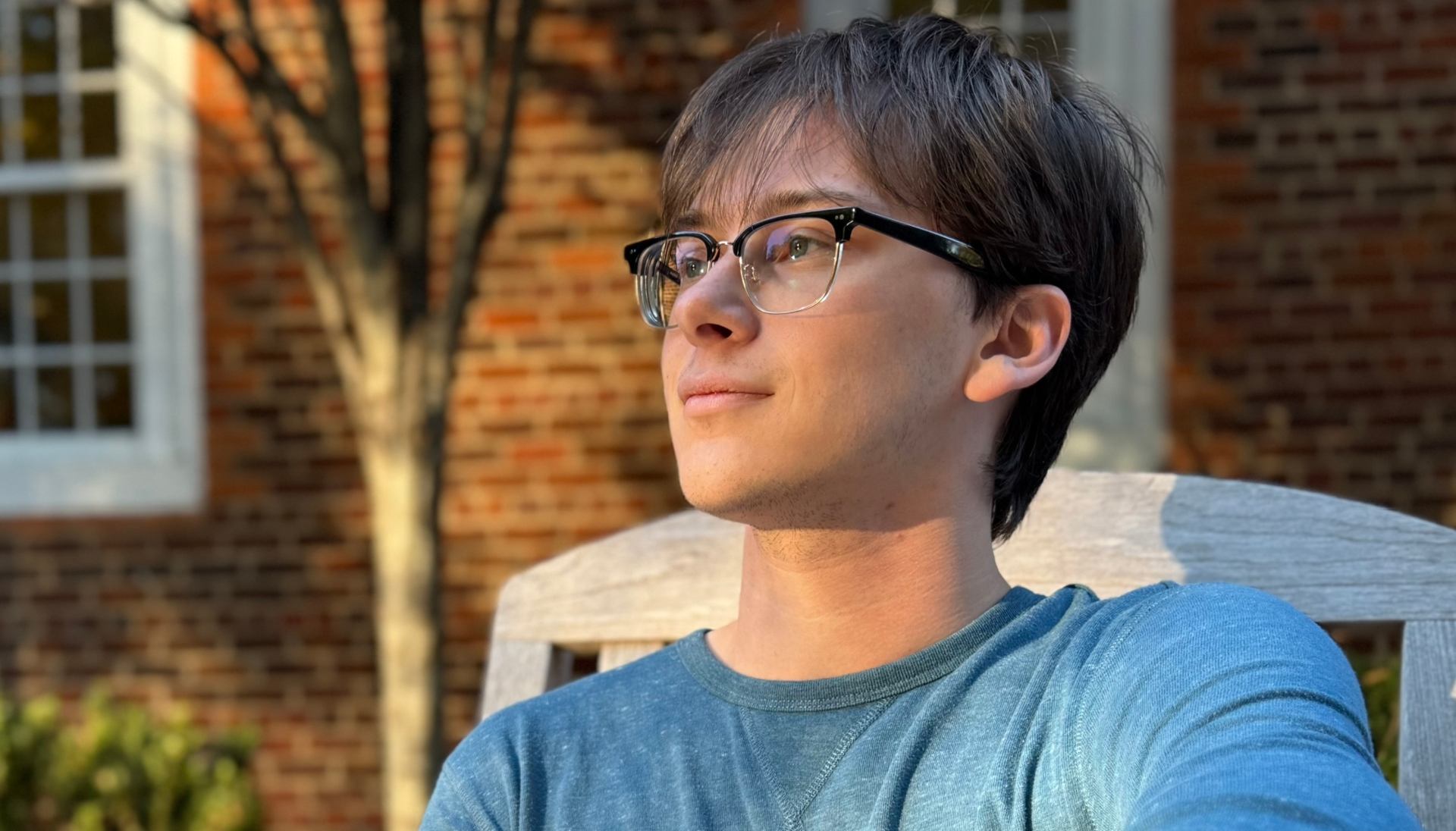
Guilford's Integrated Studies program allowed David Martin '25 to map out his own interdisciplinary major that matched his interests.
David’s major winds through religion and history and the study of grief and death. It’s a major he created on his own through Guilford’s Integrative Studies program.
“I wanted to be able to pick the classes I wanted without a set schedule. And I liked having closer relationships — to actually talk to my teachers instead of being another face in a crowd.”
David Martin ’25 speaks about death the way others talk about music or travel. That is to say with curiosity, reverence and the kind of easy familiarity that suggests long acquaintance.
“It’s not a dark subject to me anymore,” he says. “People don’t want to talk about it because they’re afraid. But you can’t go around pretending no one’s going to die. That just makes it harder when it happens.”
David graduates from Guilford College in December – a semester early – after building a self-designed major that combines religion, history and the study of grief and death. It’s an unusual academic path, born from a mixture of independence, loss and an early fascination with questions most people spend their lives avoiding.
When asked how he ended up here, David smiles, almost apologetically. “I like doing things on my own terms,” he says.
That instinct took root early. David was homeschooled through high school after medical issues made the traditional classroom unsustainable. The change, though, came with unexpected freedom – the ability to shape his days, choose his pace and pursue what caught his mind. “I wanted to be able to pick the classes I wanted without a set schedule,” he says. “And I liked having closer relationships — to actually talk to my teachers instead of being another face in a crowd.”
When it came time for college, David was drawn to Guilford for its small size and sense of community. “It felt like a place where people actually knew each other,” he says. “You walk around and people wave. That sounds small, but it mattered to me.”
David enrolled at Guilford as a Sociology and Anthropology major. That lasted a semester. Late one night, scrolling through the course catalog, he stumbled on something that seemed more like him: Guilford’s Integrated Studies program, which allows students to craft their own interdisciplinary degree. “It just clicked,” he says. “It let me study what I wanted, what I found interesting – and graduate early.”
What David wanted, it turned out, was to understand what happens when we die — and what happens to those left behind.
His curiosity about death began when he was in elementary school, after his best friend died unexpectedly. “I heard she was in the hospital and didn’t understand,” he remembers. “One day she was there. The next, she wasn’t. Nobody really explains that to you as a kid.”
At Guilford, he found professors who encouraged that curiosity instead of recoiling from it. In one class, “Death,” taught by Eric Mortensen, John A. Von Weissenfluh Professor of Religious Studies, and Religious Studies and Ethics Professor Mark Justad, he explored how cultures process dying and mourning — from Egyptian burial texts to modern embalming.
Another course with Associate Professor of History Sarah Thuesen and Sherry Giles, who recently retired as a professor of Justice and Policy Studies, examined social change, deepening his sense of how culture shapes what we fear and how we heal.
“I realized every culture has a way of dealing with loss,” he says. “The only wrong way is pretending it doesn’t exist.”
For David, the study of death has become a way of studying life — how humans make meaning out of impermanence, and how they carry on after the inevitable. He’s now working on a short film about grief and “death denial” in contemporary society, interviewing students, faculty and staff about how loss has shaped them.
“I want people to be more comfortable talking about it,” he says. “Not to be happy about death, but to be okay with the fact that it’s part of living.”
That belief has given his life a paradoxical buoyancy. David laughs easily, jokes about his “weird hobby,” and talks about death with the kind of calm that makes others feel oddly relieved.
After graduation, he’s considering graduate school — maybe in hospitality, maybe something else. “I’ve worked in event management here for three years,” he says. “And you know, there’s not as big a gap between hospitality and death as people think. Caring for someone’s loved one, helping people through grief — that’s a kind of hospitality too.”
He pauses for a moment, then grins. “Plus, at the end of the day, we’re all just guests here, right?”
It’s the kind of line that would sound glib coming from most people. From David, it feels like wisdom — the kind that’s been through Guilford’s Integrated Studies program, and shared gently with others.
“Yeah,” he says finally. “I think that’s what Guilford helped me figure out. I can’t stop people from dying. But I can help make the living part better.”
If you’re interested in shaping your own education and want to learn more about Guilford’s Integrative Studies program, contact Steve Mencarini.

